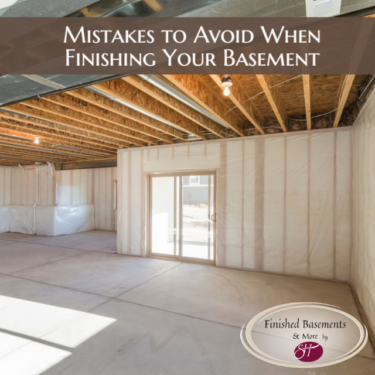8 Mistakes to Avoid When Finishing Your Basement

Avoid these common basement-finish blunders:
Where’s the Money?
First and foremost, determine how you will finance the project. If you have cash, great! Is it readily accessible? If you’re securing a HELOC or other type of loan, make sure the funds are in place before beginning the project or signing a construction agreement with a contractor. While you will should never be expected to pay in full up-front, you should be prepared to make installment payments at predefined project milestones. Failing to do so may result in project delays. Having a budget in place will also help guide the decision-making process along the way and keep overspending at bay.
What’s That Smell?
Don’t ignore musty smells in your basement, assuming that they’ll dissipate once construction is complete. The time to address funky odors is before construction begins, when the offending source can be identified and dealt with–whether it’s moisture, mold, or the decaying remains of [EEK!] a mouse.
Is That a Mirage?
While there may not be large puddles of water in your basement, there may still be areas where moisture is seeping in through cracks in the walls, windows, or crawl space. Before construction begins, take a thorough assessment of all areas of the basement to determine if there are areas that require waterproofing by the application of sealant, caulk, or a vapor barrier. You don’t want water or moisture of any kind to enter the basement behind finished walls. as this can lead to mold. Take steps prior to finishing to assure that everything stays dry.
What’s the Worst that Could Happen?
It may be tempting to proceed without a municipal permit, as they can be expensive and somewhat of a hassle to obtain. STOP. DON’T DO IT. Finishing your basement without a permit can lead to trouble down the road when you go to sell your home and are asked to verify that work done in the home meets local building codes. Or worse, if you happen to have a shoddy electrician, your house could burn down. Consider obtaining a permit as purchasing peace of mind, as you are assured with each inspection (there are several throughout the course of the building project) that the work done in your home is of professional quality and up to current safety and building codes. #priceless
I Can’t Hear You!
One upgrade that some homeowners overlook is the option to add insulation in the basement ceiling and interior walls for sound attenuation. Particularly if the main floor of the home has hard-surface flooring, basement ceiling insulation dampens the sound traveling between the two floors. On the other side, if you plan to watch movies in the basement, the sound-dampening properties of insulation will help keep the explosive din from the latest action flick from disturbing those on the main floor of the home. Adding ceiling insulation at the time of a basement finish is a no-brainer, as the rafters are already open.
Who Turned out the Lights?
One common mistake in basement finishing is not installing adequate can lighting. As many basements are inherently dark to begin with, providing sufficient lighting makes the difference between a cheerful, inviting space and a dreary, drab place where no one wants to hang out. Working with an architect to create an electrical plan will ensure sufficient lighting for the finished project.
Are You on the Level?
Many concrete basement floors have high and low points, which may not be noticeable under carpeted flooring, but can be problematic under other types of flooring, such as tile or EVP. Before hard-surface floors can be laid over concrete, the concrete–if not level–must go through a grinding process, after which it is treated with a self-leveling compound. The procedure, though effective, can be quite expensive, so evaluate the condition of the basement concrete prior to floor selection. Most contractors do not include the cost of floor grinding with the flooring selection.
Why Can’t I Buy That at Costco?
Most contractors prefer to supply their own materials, as they have access to professional-grade components from wholesale supply sources. For example, a bathroom faucet that a professional plumber obtains from his plumbing supply warehouse has metal parts, whereas one purchased from a local hardware store–even if the faucet is the same brand–usually contains plastic parts. Understandably, the plumber will not warranty a product he does not supply. Other issues can arise with homeowner-supplied items, including nonstandard sizes that may cause installation issues.

